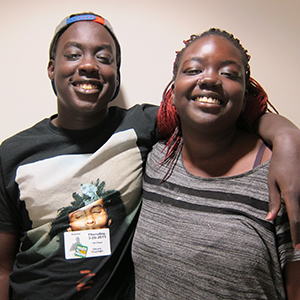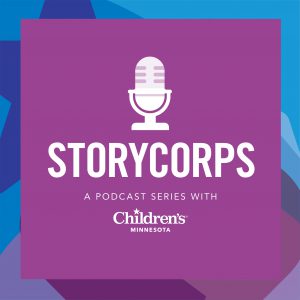Sickle Cell: Mary and Okuny’s story


About this episode
Patients Mary and Okuny discuss their individual experiences with sickle cell and how it has impacted their outlook on life. They both believe that sickle cell can not be used as an excuse, but rather a source of resilience.
Topics:
- Support
- Advice/messages
- Resilience
Transcript
Okuny: Tell me about your condition? The sickle cell disease that you have.
Mary: I have sickle cell anemia SS. I don’t know what I could say about it. I get blood transfusions every month. When I was younger, I didn’t want it to affect me in any way. Sickle cell anemia is a blood disorder. It’s where some of your red blood cells are in the shape of sickles, like banana kind of shape. With regular blood cells, they are the right shape, enough to go through your blood stream to I think it’s your blood vessels, easily. Just slide through as if they were buttered up or something like that. Just, bam. Going down the shoot. But with the bananas, the sickles, they get caught in the bloodstream and so if they get caught in the bloodstream, then your blood won’t flow through. And so then you have sickle cell pain and sickle cell pain, it can be anywhere. If it’s cold outside, you can also have it in your chest or you get acute chest syndrome or you can have pneumonia. But your sickle cell pain will start acting and you’re start having pain. You can take Tylenol an Ibuprofen, but if it’s really caught in there, the blood levels are low, then you do have to go to the hospital and you get pain meds and water and fluids. And if you have to, then you get admitted into the hospital. And if your blood levels are very low, then you do get blood transfusions. So that’s sickle cell really in a nutshell.
Okuny: Who or what has helped you the most in dealing with having sickle cell disease?
Mary: Children’s. My brother. My parents. Myself, really, once I sit down and I think, hey, I can handle this. I can handle this disease and I’m not going to let it be my life story. Sickle cell anemia isn’t cruising through life with me. It’s just in the back seat, almost.
Work hard, honest. Work your hardest. Never give up on anything.
Okuny: What advice would you pass on to those that come after you?
Mary: Don’t let sickle cell anemia control you and don’t let it be an excuse to not do anything with your life. Don’t ever use sickle cell anemia as an excuse. Go to your appointments. I want to give advice to little girls that come after me. You are gorgeous; you are beautiful. If you want to wear makeup, you go ahead and wear makeup. And if you don’t want to wear makeup, you don’t have to wear makeup. Don’t let anyone control you. Be strong. What advice would you pass on to those who come after you, like your kids?
Okuny: To people with sickle cell, the advice I would give them is stay calm and carry on. Be happy. It’s going to be OK. The pain is going to go away. Don’t worry about it. People are there to take care of you and it’s going to go away. It’s not going to last forever. You’ll be all right. You can do anything that anybody else can do, nothing about it. Do what you want to do. ’ve never had anything bad happen when I’m going through a crisis, when I’m having a lot of pain, so I’m never scared. I just know that I’m going to be taken care of if I need to go to the hospital. Or if I’m going in to see the doctors at a clinic, I know I’m going to be taken care of and I’ll be fine and it will go away soon.
Mary: Has it changed your attitude on life?
Okuny: When I was a kid I didn’t want anybody feeling sorry for me, as I do now.But I went through one period where I felt sorry for myself. I said why me, and my dad looked at me like I just killed somebody. He’s like, ‘are you serious?’ That shut it off really quick, because there are people out there who don’t have a limb, I can’t imagine what that’s like, so I don’t feel sorry for myself. I’m going to have this for the rest of my life, but who says I can’t have fun and live.
We wish to extend our thanks to the families who have shared their story here about the impact of living with hemophilia and sickle cell disease. We would also like to thank the many who worked on this project:
The Children’s Minnesota StoryCorps Legacy Team:
Eddie Gonzalez, Jocelyn Bessette Gorlin, Susan Kearney, Stephen Nelson, Margaret Heisel-Kurth, Stephanie Davis, Angela Blue, Elizabeth McDonough, Jill Swenson and Alisa Linne.
Special thanks to:
Stephanie Moua, Hamdi Hussein, Sadia Farah, Fatima Ali, Caillyn Costello, Suzanne Lehman, Suzan Ulrich, D'Ann Urbaniak Lesch, Justin Nelson, Allison Albright, Marvin Holmes-Leopold, Jose Rodriguez and Mitch Hare.
Minneapolis Institute for Production and Recording:
Jose Rodriguez and Mitch Hare.